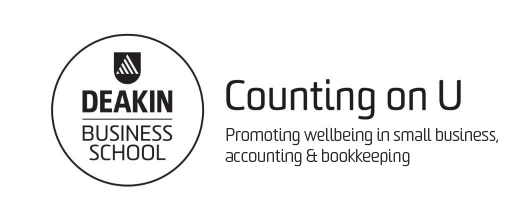Accountants and financial professionals became first responders during the Covid-19 pandemic dealing with both clients’ financial and personal crises. But were they fully equipped?
- Two Deakin University academics have created a unique program to help accounting and finance professionals identify and respond to signs of mental health issues affecting clients
- Participants in the Counting on U program learn how to administer mental health first aid and direct clients to seek help from health professionals
- The free online course also focuses on client-relationship building and communication skills
Two Australian academics have created a unique training program for accounting and finance professionals to learn how to identify and alleviate the sources of financial distress among small business owners and to assist in the prevention of long-term mental health conditions, including anxiety and depression, through the use of mental health first aid.
Counting on U is the first course of its kind in the world. It’s free to eligible participants, delivered online and equips professionals with client-relationship building and communication skills. It explains how they can direct clients to seek help from a GP, local mental health service or helpline such as Beyond Blue’s 24/7 support service.
The idea began three years ago when Professor George Tanewski, Director of the Deakin IPA-SME Research Centre, joined forces with Professor Andrew Noblet, a specialist in workplace stress and employee wellbeing from Deakin Business School.
“Through regular contact with both accounting bodies and financial planners, we were hearing about members who felt nervous about having conversations with clients who they suspected were experiencing mental health issues,” says Noblet. “They didn’t want to make matters worse and weren’t sure where to direct them to seek help.”
With most accountants shifting from a focus on compliance to providing more holistic business advice, business owners are increasingly sharing more than just their accounts, says Tanewski. “Accountants are high-trust advisers with client relationships often lasting many years. This brings them into new territory.”
With most accountants shifting from a focus on compliance to providing more holistic business advice, business owners are increasingly sharing more than just their accounts
To develop a training program that integrated mental health first aid into the everyday practices of finance professionals, Noblet and Tanewski worked with Chartered Accountants ANZ, CPA Australia, IPA, as well as Beyond Blue, WorkSafe and Mental Health First Aid Australia. The Department of Industry, Science, Energy and Resources (DISER) funded the research.
One-third of small and medium-size business owners faced stress, anxiety and depression in the past year, a survey commissioned by DISER in 2020 found. Previous research had shown that financial hardship often went hand-in-hand with mental health problems, Noblet says, and the pandemic has exacerbated this.
Signs of distress
“Many SME owners are under enormous financial pressure, especially in the current environment,” says Noblet. “Being responsible for all aspects of the business also means that they generally work long hours, feel isolated and often the only professional they see on an ongoing basis is an accountant or financial planner. Many simply don’t have the time to see a GP, let alone a mental health specialist.”
Because financial planners and accountants have long term knowledge of people’s financial and personal situation, he says, they are in a good position to identify any changes in behaviour and recognise signs of anxiety, depression, psychosis or other common mental health conditions.
“Some of these signs could include the client not getting things done, losing confidence and withdrawing from others,” he says. “Maybe they seem particularly tired or run down and have become quite pessimistic about the future.”
The mental health first aid training in Counting on U helps business advisers recognise these signs early and encourage clients to seek help. “There’s a real prevention element in it,” Tanewski says. “Research shows that a lot of people experiencing that stress just don’t get help early on.”
After participants complete the course and start applying it to their clients, they then join two “booster sessions” — video chats with an instructor and other financial advisors — to share their experiences and learn from each other.
So far, more than 300 accountants and financial planners have completed the course. Any member of the peak accounting bodies and other financial professionals are encouraged to sign up – particularly if they are in public practice. Tanewski and Noblet hope to reach at least 4,500 participants by the end of the year.
The researchers emphasise that the mental health of financial professionals themselves is also crucial. “Many financial planners and accountants are small business owners too, so the course can help them deal with their own mental health and that of their employees,” Noblet says.
